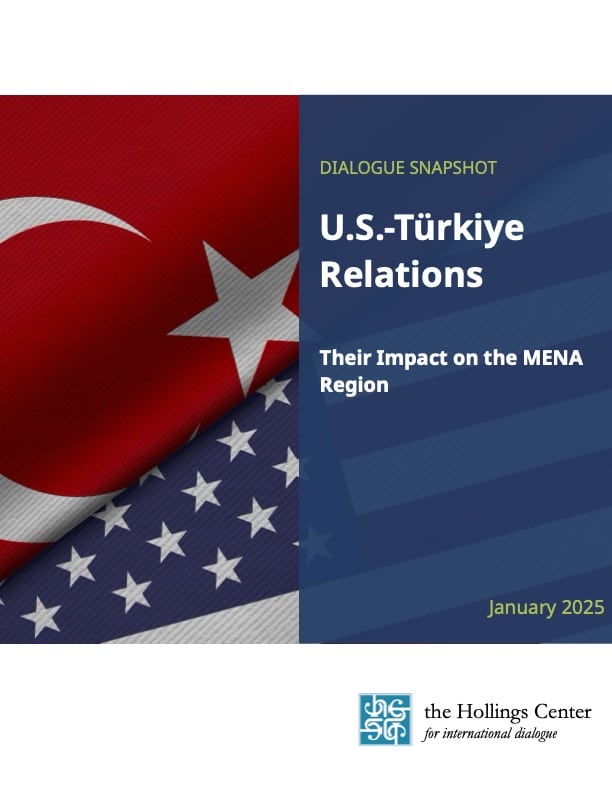DIALOGUE SNAPSHOT REPORT
June 2024
Washington, D.C.
Dialogue Summary
U.S.-Türkiye relations are evolving as both countries adapt to shifting global and regional dynamics. While differences persist in areas such as defense policies and regional strategies, recent developments indicate a potential for enhanced cooperation. The approval of Türkiye’s F-16 fighter jet purchase from the U.S. and Sweden’s NATO accession highlight steps toward renewed engagement. In June 2024, the Hollings Center hosted a dialogue to examine Türkiye’s changing role in the Middle East and North Africa (MENA) region, U.S. priorities, and opportunities for collaboration. Discussions focused on Türkiye’s foreign policy adjustments, regional engagements, and the broader trajectory of U.S.-Türkiye relations.
Türkiye has observed shifts in U.S. involvement in the region, prompting it to refine its foreign policy approach. While the U.S. remains a significant actor, its influence has become more complex, leading Türkiye to adopt a more independent and multifaceted strategy. Türkiye has engaged in diplomatic efforts to mediate regional conflicts while balancing relationships with both global and regional powers. These efforts align with its broader ambition to be a stabilizing force in the region, using its geopolitical position to strengthen strategic partnerships. However, Türkiye also faces challenges in managing its relationships with various actors while safeguarding its national interests.
Despite past tensions, U.S.-Türkiye relations continue to find common ground in areas such as defense, security, and energy. Although diplomatic engagement has encountered difficulties, recent progress in NATO cooperation and bilateral defense agreements suggests a path toward closer alignment. The future of U.S.-Türkiye relations will depend on sustained dialogue, mutual understanding, and strategic coordination, ensuring both countries can navigate their differences while advancing shared interests.
Key Takeaways of the US-Türkiye Relations Dialogue
Evolving U.S.-Türkiye Relations – The relationship between the U.S. and Türkiye is undergoing significant changes as both countries navigate shifting global and regional dynamics. While there are areas of alignment, such as security and defense, persistent challenges remain, requiring careful diplomatic engagement.
Türkiye’s Adjusted Regional Strategy – In response to evolving U.S. policies in the Middle East and North Africa (MENA), Türkiye is recalibrating its foreign policy approach. This includes increased regional engagement and efforts to position itself as a key player in security and diplomatic initiatives.
Balancing Global and Regional Partnerships – Türkiye is strengthening its relationships with various global and regional actors to enhance its geopolitical influence. By adopting a multi-faceted approach, Türkiye aims to mediate conflicts, promote economic partnerships, and maintain strategic autonomy while managing its ties with the U.S. and other key nations.
Challenges in Bilateral Relations – Despite shared strategic interests, U.S.-Türkiye relations continue to face difficulties, including disagreements over defense policies, regional conflicts, and diplomatic approaches. These challenges underscore the need for ongoing negotiations and mutual adjustments.
Opportunities for Enhanced Cooperation – Both nations have opportunities to deepen collaboration in key areas such as defense, security, energy, and counterterrorism. Strengthening these partnerships can contribute to regional stability and economic growth while fostering long-term bilateral engagement.
The Importance of Sustained Dialogue – The future of U.S.-Türkiye relations depends on continuous diplomatic engagement, trust-building, and strategic coordination. Regular dialogue and cooperative efforts will be crucial in addressing challenges and leveraging shared interests to maintain a stable and productive partnership.



